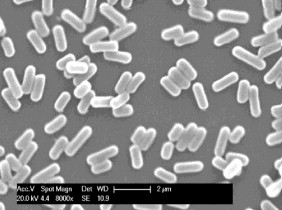Isolation and Identification of Antifungal Peptides from Bacillus BH072, a Novel Bacterium Isolated from Honey
Microbiol Res, 2013 Mar 29. pii: S0944-5013(13)00033-5
A bacterial strain BH072 isolated from a honey sample showed
antifungal activity against mold. Based on morphological, biochemical,
physiological tests, and analysis of 16S rDNA sequence, the strain was
identified to be a new subspecies of Bacillus sp. It had a broad spectrum of
antifungal activity against various mold, such as Aspergillus niger, Pythium,
and Botrytis cinerea.
Six pairs of antifungal genes primers were designed and
synthesized, and ituA, hag, tasA genes were detected by PCR analysis. The
remarkable antifungal activity could be associated with the co-production of
these three peptides. One of them was purified by 30-40% ammonium sulfate
precipitation, Sephadex G-75 gel filtration and anion exchange chromatography
on D201 resin. The purified peptide was estimated to be 35.615kDa and
identified to be flagellin by micrOTOF-Q II. By using methanol extraction,
another substance was isolated from fermentation liquor, and determined to be
iturin with liquid chromatography-mass spectrometry (LC-MS) method. The third
possible peptide encoded by tasA was not isolated in this study. The culture
liquor displayed antifungal activity in a wide pH range (5.0-9.0) and at
40-100°C.
The result of the present work suggested that Bacillus BH072
might be a bio-control bacterium of research value.

No comments:
Post a Comment